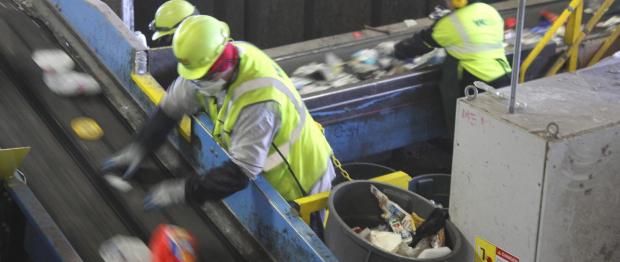According to a fresh report by Sitra, waste recycling would create more tax revenue and jobs than incineration, while improving Finland’s current account balance.
Recycling waste materials would be an economically competitive alternative to incineration plants. That is the conclusion of a fresh report drawn up by Gaia Consulting on behalf of Sitra. The report was published on 27 January 2014 in Turku, where long-term solutions are being sought to waste disposal in south-west Finland.
“Incineration has been considered the only financially viable, cost-effective waste disposal system,” says Sitra Director Mari Pantsar-Kallio. “Our report shows that waste material recycling actually makes more financial sense than incineration, particularly from the perspective of employment, tax revenue and Finland’s current account. Recycling also trumps incineration in terms of cutting emissions and saving natural resources.”
The report investigated the economic impact, measured in terms of waste volumes, of two waste disposal solutions in urban areas on the west coast of Finland. An “energy solution”, based on light sorting at the waste creation site combined with a waste incineration facility investment, was compared to a “material solution”, based on effective sorting at the waste creation site and versatile use of recycled material for further processing and as fuel.
Calculations show that the material solution would create over 60 more local jobs than incineration. The material solution would also have a positive effect on Finland’s current account balance, to the tune of EUR 1.2 million per year.
In addition, the material solution would have a more beneficial effect than incineration on municipal and national tax revenues. The report suggests that a recycling-based solution would generate EUR 8.9 million per year in national tax revenues, compared to the energy solution’s EUR 7.4 million. Municipal tax revenues would also grow by slightly more than in the case of the energy solution.
“The results are based on the direct effects of different waste disposal solutions if implemented in the current operating environment. When you add in the multiplier effect, such as jobs in processing chains and substitution for virgin raw material consumption, the differences are even greater,” says the report’s author, Ville Karttunen of Gaia Consulting.
At the report’s publication event, Minister of the Environment Ville Niinistö referred to the importance of waste recycling, particularly from the point of view of Finnish cleantech firms. “The Ministry of the Environment is seeking to develop waste policy to the point where waste materials are reused to the greatest possible extent. This would also provide huge growth opportunities for Finnish environmental technology companies. What is more, domestic market references would create export potential,” Niinistö emphasised.
The purpose of the report was to identify the overall economic benefit to society, while broadening the scope of municipal waste solution evaluation from investment calculations at company level to assessing the effects on the national economy.
“In the case of waste companies under municipal ownership in particular, we need to assess the overall effects of waste disposal investments on the economy, while evaluating the benefits of using Finnish technology and recycling at regional and then at national level,” explains Pantsar-Kallio.
The report continues the discussion initiated by Sitra on the effects of investments on regional economies. In September 2013, Sitra published a corresponding report on the importance of fuel selection in energy investments. The new waste report forms part of Sitra’s Industrial Symbiosis project area, which seeks to expedite the formation of globally competitive symbioses. Through these, companies would create added value for one another by making efficient use of raw materials, technology, services and energy.
For further information, please contact:
Mari Pantsar-Kallio, Director, Sitra
tel. +358 29 461 8210, mari.pantsar-kallio@sitra.fi
Pasi Rinne, Chairman of the Board, Gaia Consulting
tel. +358 400 464 127, pasi.rinne@gaia.fi
Jyri Arponen, Leading Specialist, Sitra
tel. +358 40 766 2906, jyri.arponen@sitra.fi
